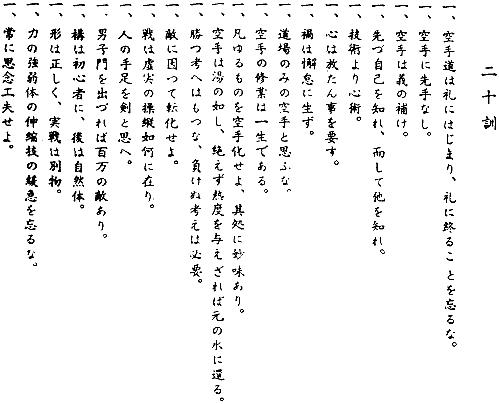| Gichin Funakoshi's - "Twenty Principles" |
Gichin Funakoshi (1868 - 1957) was the creator of Shotokan karate, perhaps the most widely known style of karate, and is attributed as being the "father of modern karate". Following the teachings of Anko Itosu and Anko Azato, he was one of the Okinawan karate masters who introduced karate to the Japanese mainland in 1922. He taught karate at various Japanese universities and became honorary head of the Japan Karate Association upon its establishment in 1949. Funakoshi published several books on karate including his autobiography, Karate-Do: My Way of Life. His legacy, however, rests in a document containing his philosophies of karate training now referred to as the niju kun, or "twenty principles". These rules are the premise of training for all Shotokan practitioners and are published in a work titled The Twenty Guiding Principles of Karate. Within this book, Funakoshi lays out 20 rules by which students of karate are urged to abide in an effort to "become better human beings".

| 空手道は礼に始まり礼に終る事を忘るな | Karate-do begins and ends with courtesy |
| 空手に先手なし | There is no attacking first in Karate |
| 空手は義の補け | Karate stands on the side of justice. |
| 先づ自己を知れ而して他を知れ | First know yourself, then know others. |
| 技術より心術 | Mentality over technique. |
| 心は放たん事を要す | The heart must be set free. |
| 禍は懈怠に生ず | Calamity springs from carelessness. |
| 道場のみの空手と思ふな | Karate goes beyond the dojo. |
| 空手の修業は一生である | Karate is a lifelong pursuit. |
| 凡ゆるものを空手化せよ其処に妙味あり |
Apply the way of karate to all things. Therein lies its beauty. |
| 空手は湯の如し絶えず熱度を与えざれば元の水に還る | Karate is like boiling water; without heat, it returns to its tepid state. |
| 勝つ考は持つな負けぬ考は必要 | Do not think of winning. Think, rather, of not losing. |
| 敵に因って轉化せよ | Make adjustments according to your opponent. |
| 戦は虚実の操縦如何に在り | The outcome of a battle depends on how one handles emptiness and fullness (weakness and strength). |
| 人の手足を剣と思へ | Think of hands and feet as swords. |
| 男子門を出づれば百万の敵あり | When you step beyond your own gate, you face a million enemies. |
| 構は初心者に後は自然体 | Formal stances are for beginners; later, one stands naturally. |
| 形は正しく実戦は別物 | Perform prescribed sets of techniques exactly; actual combat is another matter. |
| 力の強弱体の伸縮技の緩急を忘るな | Do not forget the employment of withdrawal of power, the extension or contraction of the body, the swift or leisurely application of technique. |
| 常に思念工夫せよ | Be constantly mindful, diligent, and resourceful, in your pursuit of the Way. |